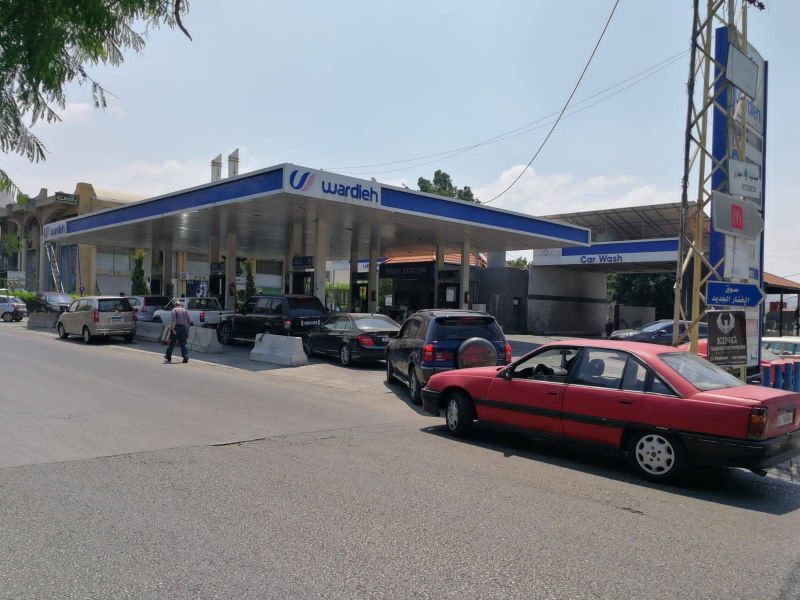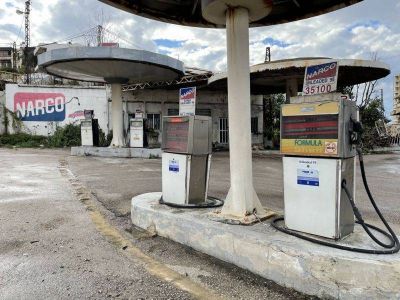
Cars line up, waiting for their turn to fill up fuel at a Wardieh gas station in Saida. on Aug. 22. (Credit: Muntasser Abdallah)
It has continued to partially reduce this ratio, despite the announcement of their lifting for almost a year, while gasoline subsidies mitigating the increase in prices of 20 liters of 95 and 98-octane fuel seem to be in the process of being permanently and totally removed in a Lebanon in crisis — whose currency collapses at the same pace as the economy.
A trend confirmed by the fuel import and distribution channels, in the absence of an official announcement from the authorities, and which seems like a déjà vu of historical repetitions. Last summer, the Lebanese authorities had begun lifting these subsidies. In Oct. 2021, they announced that fuel prices, which had been subsidized by the Banque du Liban, would be more or less aligned with the dollar and Lebanese lira parallel market rate, which was then LL21,000 to the dollar, well below the current level of LL34,000, but already far from the official parity of LL1,507.5.
The government then had to slow down somewhat, but without changing course, in the face of the discontent caused by the rise in prices linked to the continued collapse of the national currency but also of world crude oil prices, which have also been sustained since the end of 2020. And if for several months, the prices of gas cylinders and diesel for private generators have been fluctuating in line with the market, those of gasoline still benefit from the last piece of subsidies provided by BDL. This mechanism mitigates the price variations linked to the lira.
Until now, the BDL still guarantees a ratio of dollars on the invoices of gasoline importers that it agrees to provide at the rate of its Sayrafa platform, which is usually a few thousand pounds below the market rate (LL27,200 as of Wednesday evening), the rest must be provided by the interested parties. Up from 100 percent last March, this ratio dropped to 85 percent in July, then 70 percent last week and finally 55 percent at the beginning of this week.
Fifteen points per week
When contacted, neither the spokesman for the Union of Petrol Station Owners, Georges Brax, who believes that the complete and final lifting of the remaining subsidies on gasoline was now acquired and is imminent, nor the president of the Association of Petroleum Importing Companies, Maroun Chammas, were able to provide information on the rest of the schedule.
But a source in the management of one of the country's major fuel distributors expects BDL to decrease the dollar ratio by 10 to 15 percentage points each week until it falls to zero. "After that point, the price should then be set by the Ministry of Energy and Water entirely according to the dollar to lira rate in the market, with a margin of LL1,000 to LL2,000," the source said.
Echoing this prospect, several players in the fuel sector in Lebanon yesterday called for an increase in the margin granted to them in the established rates. After a meeting in Hazmieh, representatives of the Union of Petrol Station Owners, as well as tanker owners and fuel distributors, in a joint statement, called on the Ministry of Energy to "increase the profit margin in US dollars" in order to be able to continue their operations, in a text distributed by the state-run National News Agency.
A LL1,000 increase
In the morning, the Ministry of Energy published a new fuel tariff. The 20 liters of 95 and 98-octane gasoline increased very slightly by LL1,000 to LL592,000 and LL605,000, respectively, while 20 liters of diesel for vehicles saw an increase of LL13,000 and now sells for LL710,000. The price of a gas cylinder remains at LL335,000. Finally, the price of a kiloliter of diesel, used in particular for private generators — a makeshift solution to the shortcomings of the public supplier Electricité du Liban’s lack of energy supply — has risen by $14, to $984 dollars, not counting the cost of transport (LL597,000 per kiloliter). It’s important to note that the price of 20 liters of gasoline is about LL100,000 lower than the amount reached in June when oil prices reached historical records ($140 for Brent and about $1,256 for the US’ West Texas Intermediate). "BDL appears to have waited for crude prices to settle down (they are currently hovering below $100) to begin the final removal of subsidies with minimal impact on consumers," according to the anonymous distributor mentioned above.
The beginning of the lifting of subsidies has finally, and as in almost every similar episode, coincided with new problems with the supply of gasoline to service stations — and, less understandably, to some owners of generators with diesel. In this regard, gas station owners have criticized the delay in the publication of tariffs by the Ministry of Energy, "which leads to a delay in the delivery of fuel to the stations and therefore problems with customers," according to the joint statement. If solutions are not found immediately, the owners of service stations "will be forced to take measures" of retaliation, added the statement.
If Maroun Chamas assures that the quantities currently delivered of fuel and gasoline are sufficient for the needs of the market (nearly 50 million liters per week across different categories like 95 and 98-octane fuel), he does not doubt that some distributors may have decided not to sell their stocks until the prices further increase. Finally, according to the distributor contacted, one of the importers has seen two of its tankers blocked for a week because of a delay in the release of credits by the BDL, which has increased the pressure on the market.
This article was originally published in French with L'Orient-Le Jour.
